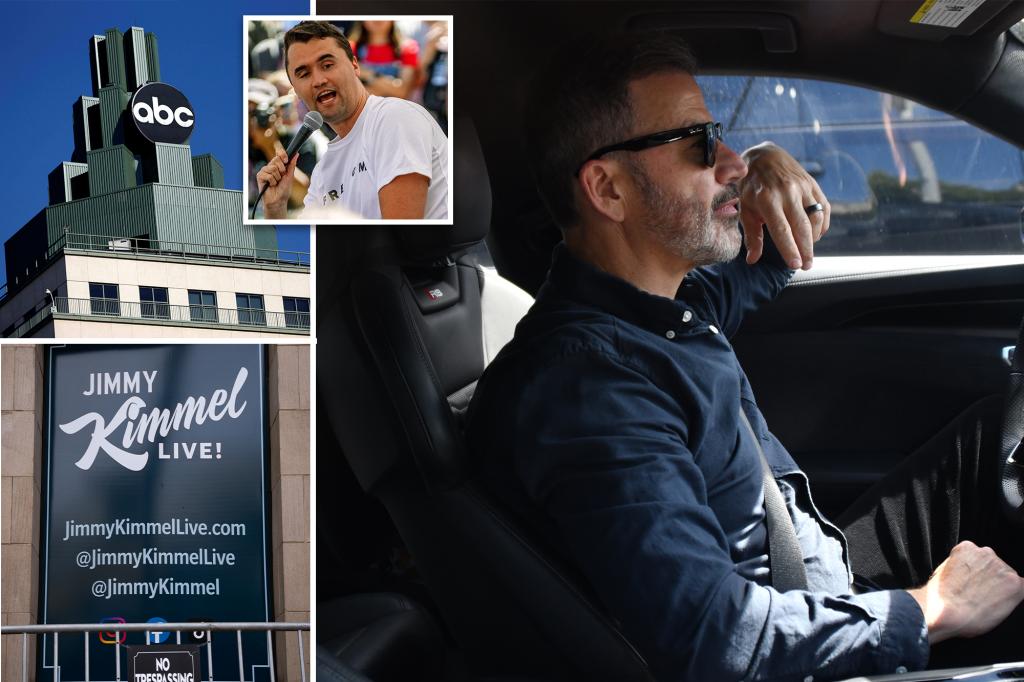The Jimmy Kimmel Controversy: A Clash of Comedy, Politics, and Media Responsibility
In a dramatic turn of events for late-night television, Jimmy Kimmel’s show has been suspended indefinitely by Disney executives following controversial comments about Charlie Kirk’s death. The $16-million-a-year host emerged from his Los Angeles home Thursday afternoon, driving to an office complex in Century City amid the fallout, but has so far refused to apologize for his remarks. Surprisingly, ABC insiders revealed that Kimmel’s Monday night monologue—in which he falsely claimed a “MAGA gang” member was responsible for Kirk’s killing—didn’t initially register as particularly offensive to the show’s staff. “He’s said much worse,” noted one source close to the situation, perhaps reflecting how normalized Kimmel’s anti-Trump rhetoric has become on the program. Indeed, over the past year, nearly every Kimmel monologue has featured extensive segments criticizing President Trump and his supporters, with recent shows dedicating over ten minutes each to Trump-related commentary.
The controversy stems from Kimmel’s comments about Charlie Kirk’s accused killer, Tyler Robinson, whom investigators have described as “deeply indoctrinated with leftist ideology.” Robinson allegedly inscribed pro-trans and anti-fascist messages on his bullets before the killing. Despite this evidence, Kimmel told his audience: “We hit some new lows over the weekend, with the MAGA gang trying to characterize this kid who killed Charlie Kirk as anything other than one of them and doing everything they can to score political points from it.” This statement wasn’t an improvised remark but a scripted joke that went through the show’s usual vetting process, according to sources. FCC Chairman Brendan Carr later condemned Kimmel’s comments as appearing to “directly mislead” the public, emphasizing in a CNBC interview that “the issue that arose here was not a joke” but rather misleading viewers about “one of the most significant political events we’ve had in a long time.”
Inside ABC, the decision to suspend Kimmel has created significant anxiety among staff members who fear for their jobs. “Everyone is freaked out,” said one network source, describing a climate of paranoia where employees are reluctant to put anything in writing regarding the controversy. The suspension decision came directly from Disney CEO Bob Iger and TV boss Dana Walden, reportedly after pressure from Nexstar and Sinclair, the two largest owners of ABC affiliate stations. Kimmel reportedly learned his show was being put on hold during a Wednesday afternoon phone call from Walden. The timing is particularly notable as Nexstar is currently seeking Trump administration approval for its $6.2 billion acquisition of rival Tegna, suggesting potential business interests underlying the media response.
President Trump celebrated the news of Kimmel’s hiatus, calling the “ratings-challenged” and “ZERO talent” host’s suspension “great news for America” in a post on Truth Social. He praised ABC for “finally having the courage to do what needed to be done.” Indeed, Kimmel’s show had been experiencing significant ratings challenges even before this controversy, with viewership plunging 43% from 1.95 million in January to just 1.1 million last month. Sources close to Kimmel told media outlets that the host was “absolutely fucking livid” upon learning of his suspension and is now “actively looking” for ways to exit his contract with ABC. “Jimmy is pissed over the decision to suspend him and the show, and he isn’t going to take this lightly,” one source revealed, with another adding they’ve “never seen Kimmel this angry.”
The aftermath has revealed deeper tensions between Kimmel and network executives. According to insider reporting from Deadline and The Hollywood Reporter, when confronted about his remarks, Kimmel refused to apologize, maintaining he had nothing to say sorry for. He reportedly told executives that he intended to “clarify” his remarks but then wanted to double down on criticizing Trump supporters. This stance has complicated potential reconciliation efforts. In Kimmel’s absence, ABC has been broadcasting “Celebrity Family Feud” in his time slot, while dozens of ABC affiliate stations under Sinclair Broadcast Group planned to air a special “in remembrance of Charlie Kirk” on Friday. Sinclair has taken a firm position, demanding that Kimmel both apologize and make a substantial personal donation to Kirk’s organization, Turning Point USA, before they will consider allowing his show back on their stations.
This controversy highlights the evolving landscape of late-night comedy in our polarized political climate. What began as a mischaracterization in a comedy monologue has escalated into a high-stakes standoff involving network executives, federal regulators, major broadcasting groups, and political figures. The situation raises important questions about the responsibilities of comedians and media platforms when addressing sensitive political topics, especially in cases involving violence. As viewers and stakeholders from across the political spectrum react to Kimmel’s suspension, the outcome will likely influence how networks approach politically charged content in the future. For Kimmel himself, the path forward remains uncertain—whether he’ll eventually apologize to return to ABC or seek new opportunities elsewhere where his brand of political comedy might face fewer constraints. Either way, this episode serves as a powerful reminder of how quickly the lines between entertainment, business interests, and political discourse can become blurred in today’s media environment.


